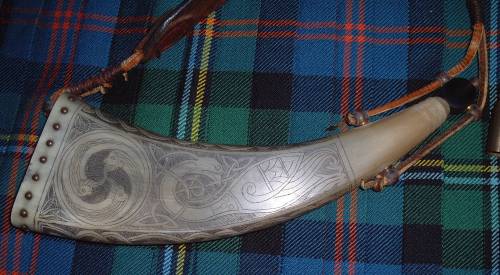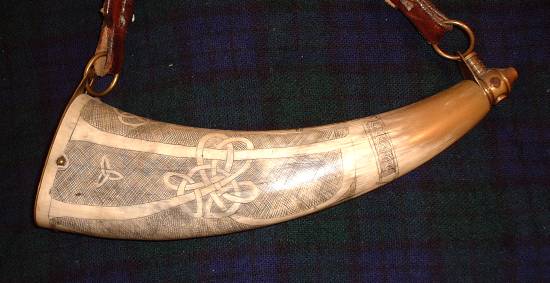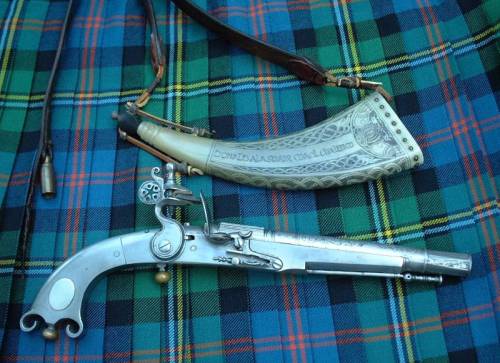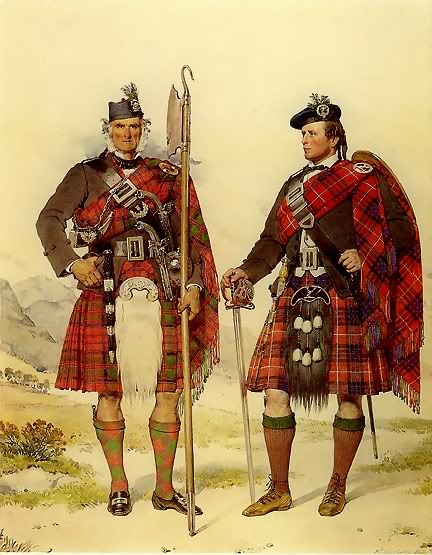I have "searched on site for discussions & Pictures of the "flat Scottish Powder horn, but to no avail. A leads ??
Thank you, Jack
| Jack W. Englund wrote: |
| I have "searched on site for discussions & Pictures of the "flat Scottish Powder horn, but to no avail. A leads ??
Thank you, Jack |
What do you want to knoW?
If you are looking for pictures and descriptions, the best two sources I know of are "Swords and Sorrows" which has a nice selection of full color plates and Drummond's "Ancient Scottish Weapons;" however, these illustrations are line drawings in black and white unless you are an original copy from the 19th C. or one of the recently reprinted, limited edition copies with faintly colored plates.
I know of several individuals who have made flat Scottish horns, in fact I have made a couple myself. The process really isn't that hard. Cut off the butt end to get a nice flat and even bottom. Cut off the nozzel end at the point you want (it should be solid horn there and carefully drill a hole from the nozzel end into the interior cavity of the horn. A 3/8" hole or a little larger will work. This is your pouring hole.
Carve a rectangular wooden mold from an old 2x4 or some such wood that basically is the shape you want the horn's butt end to be when completed. Shape it so that it will extend into the horn 1 - 1.5 inches if possible when you complete the next step. You will need to taper the plug as it fits into the horn's interior.
Find a nice horn that is curved in only one dimension and boil it in water for about 2 to maybe 3 hours. The horn will get as soft as it's going to get but not really pliant.
Take the horn when it is as soft as it's going to get and force in the wooden mold you carved. Now here is the tricky part. You need to have several large clamps and a vice set-up with a couple of wooden boards covering the jaws of the vice. While still hot, place the horn in the vice between the boards and squeeze it until the sides are flat. The top and bottom of the horn around the butt plug will swell up and down but you should get a pretty tight fit forcing the horn into a rectangular shape. Use a large "C" clamp or two to force the upper and bottom "sides" into better contact with the butt plug. Don't sweat it if it's not perfect at this point.
Let cool overnight. When loosened from the vice/clamps, your horn will be close to flat but no cigars at this point.
Now take files, sandpaper, sanding sponges, etc. and use them to better shape the horn into a rectangular shape, especially the top and bottom. This is the time to shape the spout end as you want it to appear. These spouts were generally not round but continued the rectangular shape of the horn.
When you get everything about right, its time to finish the butt. Find a nice piece of hardwood and shape it so that it represents the shape you want the finished butt to look like. You may want to round the corners very slightly but make it a snug, slightly oversized fit. It should go into the horn 1/2 - 3/4". Boil the butt end of the horn only until it begins to get somewhat soft. If you over heat it, it will loose its shape altogether. When a bit pliable, dry it off and fit the finished butt plug by tapping it in place with a soft hammer - like a rubber mallet for instance. If you shaped the butt plug right it will be a bit of a chore but you will get a snug fit. Chuck it up on the vice as before along with the "C" clamps and let dry for a day. Adjust the clamps as necessary to get a really good fit. If it's too loose, your plug is too small. Fit another.
To finish, drill some small holes around the butt plug, through the horn and into the plug. To peg the plug to the horn, I used large wooden match sticks driiped in wood glue. Point the end of the stick and tap into place. You can trim the remaining stick off and sand smooth.
On the butt plug I made, I cut a "q" shape protruding outwards from the end of the plug. The hole in the "q" is for attaching it to a cord or narrow strap. You can get fancy with this shape if you like. I have also seen several horns where a protrusion was left near the spout end while shaping and filing, standing up enough from the final shape of the horn so that a hole can be carefully drilled for a cord or strap at that end. If you're handy, make a German silver or brass band around the end of the horn for "pretty." An ebony fiddle tuning screw makes a nice plug.
Finish to taste, scrimshaw, etc.
" Ask me not for shame, My Meister wil deny Thee. Drink les and buy ane. Anno Domini 1688." Inscription on an original horn.
Hope this diatribe helps a bit for those so inclined. Be prepared to ruin a horn before you get the technique down and then be prepared to wonder how the old time horners got the derned things so flat and rectangular!!
I know of several individuals who have made flat Scottish horns, in fact I have made a couple myself. The process really isn't that hard. Cut off the butt end to get a nice flat and even bottom. Cut off the nozzel end at the point you want (it should be solid horn there and carefully drill a hole from the nozzel end into the interior cavity of the horn. A 3/8" hole or a little larger will work. This is your pouring hole.
Carve a rectangular wooden mold from an old 2x4 or some such wood that basically is the shape you want the horn's butt end to be when completed. Shape it so that it will extend into the horn 1 - 1.5 inches if possible when you complete the next step. You will need to taper the plug as it fits into the horn's interior.
Find a nice horn that is curved in only one dimension and boil it in water for about 2 to maybe 3 hours. The horn will get as soft as it's going to get but not really pliant.
Take the horn when it is as soft as it's going to get and force in the wooden mold you carved. Now here is the tricky part. You need to have several large clamps and a vice set-up with a couple of wooden boards covering the jaws of the vice. While still hot, place the horn in the vice between the boards and squeeze it until the sides are flat. The top and bottom of the horn around the butt plug will swell up and down but you should get a pretty tight fit forcing the horn into a rectangular shape. Use a large "C" clamp or two to force the upper and bottom "sides" into better contact with the butt plug. Don't sweat it if it's not perfect at this point.
Let cool overnight. When loosened from the vice/clamps, your horn will be close to flat but no cigars at this point.
Now take files, sandpaper, sanding sponges, etc. and use them to better shape the horn into a rectangular shape, especially the top and bottom. This is the time to shape the spout end as you want it to appear. These spouts were generally not round but continued the rectangular shape of the horn.
When you get everything about right, its time to finish the butt. Find a nice piece of hardwood and shape it so that it represents the shape you want the finished butt to look like. You may want to round the corners very slightly but make it a snug, slightly oversized fit. It should go into the horn 1/2 - 3/4". Boil the butt end of the horn only until it begins to get somewhat soft. If you over heat it, it will loose its shape altogether. When a bit pliable, dry it off and fit the finished butt plug by tapping it in place with a soft hammer - like a rubber mallet for instance. If you shaped the butt plug right it will be a bit of a chore but you will get a snug fit. Chuck it up on the vice as before along with the "C" clamps and let dry for a day. Adjust the clamps as necessary to get a really good fit. If it's too loose, your plug is too small. Fit another.
To finish, drill some small holes around the butt plug, through the horn and into the plug. To peg the plug to the horn, I used large wooden match sticks driiped in wood glue. Point the end of the stick and tap into place. You can trim the remaining stick off and sand smooth.
On the butt plug I made, I cut a "q" shape protruding outwards from the end of the plug. The hole in the "q" is for attaching it to a cord or narrow strap. You can get fancy with this shape if you like. I have also seen several horns where a protrusion was left near the spout end while shaping and filing, standing up enough from the final shape of the horn so that a hole can be carefully drilled for a cord or strap at that end. If you're handy, make a German silver or brass band around the end of the horn for "pretty." An ebony fiddle tuning screw makes a nice plug.
Finish to taste, scrimshaw, etc.
" Ask me not for shame, My Meister wil deny Thee. Drink les and buy ane. Anno Domini 1688." Inscription on an original horn.
Hope this diatribe helps a bit for those so inclined. Be prepared to ruin a horn before you get the technique down and then be prepared to wonder how the old time horners got the derned things so flat and rectangular!!
Here is a photo of a horn made by my best friend, Don Malcolm of Roanoke Rapids, NC. He made it to go with his Coach Harness pistol.
Glen's description of making a flat horn is detailed and exactly the right procedure. The one flat horn that I have made, and it isn't very flat, was not boiled to fit the plug because I was concerned that it would pop back into its original shape. Instead I very carefully tapered the outline of the plug then forced it in as far as I could go. There were some tiny gaps but I used some wood filler then fitted a brass plate over the end of the horn. As Glen says, you can ruin a lot of horns trying to get one flattened and the horn should be straight, i.e. without any twist, in order to have a chance of getting a good one.
Don, who is an outstanding craftsman, based his design on illustrations from the Book of Kells. You cannot see them, but the strap has a powder measure and vent pick attached.
 Attachment: 30.12 KB
Attachment: 30.12 KB

Glen's description of making a flat horn is detailed and exactly the right procedure. The one flat horn that I have made, and it isn't very flat, was not boiled to fit the plug because I was concerned that it would pop back into its original shape. Instead I very carefully tapered the outline of the plug then forced it in as far as I could go. There were some tiny gaps but I used some wood filler then fitted a brass plate over the end of the horn. As Glen says, you can ruin a lot of horns trying to get one flattened and the horn should be straight, i.e. without any twist, in order to have a chance of getting a good one.
Don, who is an outstanding craftsman, based his design on illustrations from the Book of Kells. You cannot see them, but the strap has a powder measure and vent pick attached.

Here is a photo of my own pitiful attempt at making a flat horn. I put a lot more effort into the scrimshaw than I did the horn. I made it about 25 years ago and I think I may have 30 hours invested. It still did not turn out very well. However, as a powder container and dispenser it serves extremely well.
One thing to remember is that all flat horns are not Scottish in origin. Flattened horns were made in this country and on the continent of Europe. Also, all Scottish horns are not flat, although from the preponderence of antique flat horns it appears that most of them were. Some round, carved horns were made during the Victorian "Highland Craze". I saw one of those at Elean Donan castle a number of years ago.
 Attachment: 25.86 KB
Attachment: 25.86 KB

One thing to remember is that all flat horns are not Scottish in origin. Flattened horns were made in this country and on the continent of Europe. Also, all Scottish horns are not flat, although from the preponderence of antique flat horns it appears that most of them were. Some round, carved horns were made during the Victorian "Highland Craze". I saw one of those at Elean Donan castle a number of years ago.

just thought i would mention that besides boiling the horn, soaking it in vineger is a very effective way of softening a horn for flattening.
| John Winn wrote: |
| just thought i would mention that besides boiling the horn, soaking it in vineger is a very effective way of softening a horn for flattening. |
I have also seen an article which said that dry heat could be used, although I would think trying that would bring its own set of problems. I have a Scottish horn made by Jim Bishop of Illinois, which I bought from the Scottish Tartans Museum. According to Mr. Bishop, he could successfully flatten one of every ten horns he tried, which points out the difficulty one has in finding a suitable horn. The technique is pretty straightforward, the problem lies with the raw material, at least according to Mr. Bishop.
Last edited by Lin Robinson on Sat 05 Jun, 2010 5:51 am; edited 1 time in total
Here is another view of Don Malcolm's horn, this time with his Coach Harness Doune pistol.
 Attachment: 36.43 KB
Attachment: 36.43 KB


I used viniger as well but it seems to discolor the horn. From what I have been able to tell, it's the grain of the horn that's the critical factor as these are, after all, extrusions from the head of a cow! Trying to buy a horn unseen for a project like this is futile. You have to search through bins or such and find one that looks like it could straighten out and has a close, smooth flat grain.
How often were unflattened, undecorated horns used in the Highlands?
| A. Spanjer wrote: |
| How often were unflattened, undecorated horns used in the Highlands? |
That is a difficult question to answer. It seems that nearly all preserved original powder horns were flattened and decorated. I think we can assume - always a dangerous thing to do - that at least a portion of horns used in the Highlanders were not flattened and were either undecorated or mininally so. One major factor must always be the economic state of the Highlands, where the majority of the people were unemployed or underemployed and the poor subsistence farmer and herdman dominated. Those folks probably made their powder horns - if they owned a firearm - in the simplest and least expensive way possible. There is no way to quantify that though and the flattened, carved and/or scrimshawed will always be associated with the Highlander.
| Lin Robinson wrote: | ||
That is a difficult question to answer. It seems that nearly all preserved original powder horns were flattened and decorated. |
It could also be, of course, that the flattened, scrimshawed ones were preserved because they were decorated and the more mundane ones were not.
That could be and I have always thought that was too bad because the every day things used by the rank and file are so indicative of their situation and would be great learning tools.
As an aside, a gentleman selling antiques at a Highland games I visited a few years ago showed me a round horn which he said was of Scottish manufacture. He based his opinion on a small flag engraved near the spout that appeared to sport a St. Andrews cross. While the horn was surely an antique, I thought the flag was a Confederate battle flag as the horn had other decoration which, to me at least, dated it to the mid-19th c.
As an aside, a gentleman selling antiques at a Highland games I visited a few years ago showed me a round horn which he said was of Scottish manufacture. He based his opinion on a small flag engraved near the spout that appeared to sport a St. Andrews cross. While the horn was surely an antique, I thought the flag was a Confederate battle flag as the horn had other decoration which, to me at least, dated it to the mid-19th c.
Some of the best examples (in my opinion) of Scottish powder horns come from the 19th century, although by the Victorian era these were mainly worn for decoration as part of full Highland dress and more likely served a secondary role as snuff mulls or whisky flasks than as containers for gunpowder. Both round and flattened powderhorns were used, though the preference for flat powder horns (a style found throughout northwestern Europe) was predominate. Here are some examples from that era:






























Here are a couple of additional examples from my own collection:




Those are beautiful horns. They are all Victorian and later, of course, and suffer from the excessive decoration used on most every object in Victorian times. IMHO, the earlier horns are more interesting both from a stylistic and historical point of view, as they represented something that was meant to be used for what it was, and not necessarily as an art piece. However, it is still easy to appreciate the craftsmanship of the Victorian era horns, and other things as well.
Actually the round horn shown in the last set of pics is Georgian rather than Victorian. The silver is hallmarked for the year 1824 - this was two years after King George IV's famous visit to Scotland that set off the craze for all things Highland, which continued to flourish during Victoria's reign. Personally I prefer the elaborate and excessive "bling" of the Victorian era to the rather more subdued plainess of the 18th century; both periods are equal historic importance and interest, just from different perspectives.
Here is a nice photo of a modern recreation of the 18th century style Scottish powderhorns. Unfortunately, I can't remember the name of the maker. It is a beautiful horn at any rate:

Here is a nice photo of a modern recreation of the 18th century style Scottish powderhorns. Unfortunately, I can't remember the name of the maker. It is a beautiful horn at any rate:

| Lewis A. wrote: |
| Actually the round horn shown in the last set of pics is Georgian rather than Victorian. The silver is hallmarked for the year 1824 - this was two years after King George IV's famous visit to Scotland that set off the craze for all things Highland, which continued to flourish during Victoria's reign. Personally I prefer the elaborate and excessive "bling" of the Victorian era to the rather more subdued plainess of the 18th century; both periods are equal historic importance and interest, just from different perspectives.] |
Close enough to Victorian times. Yes, the "Tartan Craze" of the 19th c. inspired a lot of imitation based on idealized views of the Scottish Highlander - thanks to a Lowlander, Sir Walter Scott. While all the stuff made in Victorian and Georgian times to relieve the "enthusiasts" of their money are certainly interesting, they bear such a faint resemblance to what was used by the True Highlander - a frequently abused term during the Tartan Craze - that they add nothing to the study of history. Even so, they are pleasing to look at and thank you for sharing them.
| Lin Robinson wrote: |
|
Close enough to Victorian times. Yes, the "Tartan Craze" of the 19th c. inspired a lot of imitation based on idealized views of the Scottish Highlander - thanks to a Lowlander, Sir Walter Scott. While all the stuff made in Victorian and Georgian times to relieve the "enthusiasts" of their money are certainly interesting, they bear such a faint resemblance to what was used by the True Highlander - a frequently abused term during the Tartan Craze - that they add nothing to the study of history. Even so, they are pleasing to look at and thank you for sharing them. |
We have to remember that the Victorian era and the Highland "Romantic Revival" is just as much a part of history as the Jacobite Rebellions and the Highland Clearances that followed them. History is whatever has preceded the present, and without the romantic revival of the 19th century we would not have such things as named clan tartans, crested clansmen's badges, or the wearing of the kilt in the 21st century. Many a true-born Highlander sported such elaborately adorned finery in the Victorian era, just as their grandfathers had gone in for somewhat less ostentacious examples in the previous century:
[ Linked Image ]
[ Linked Image ]

[ Linked Image ]
Times change, fashions and tastes change, but all are equally valid as a part of history.
I came across a term in Christian Hesketh's "Tartans" that seems to sum up all of the Victorian excesses: "Balmoralization." Like the sporrans on the figures above, don't you just want to take a sharp pair of shears and cut-off about a foot of hair!
Page 1 of 2
You cannot post new topics in this forumYou cannot reply to topics in this forum
You cannot edit your posts in this forum
You cannot delete your posts in this forum
You cannot vote in polls in this forum
You cannot attach files in this forum
You can download files in this forum
All contents © Copyright 2003-2006 myArmoury.com — All rights reserved
Discussion forums powered by phpBB © The phpBB Group
Switch to the Full-featured Version of the forum
Discussion forums powered by phpBB © The phpBB Group
Switch to the Full-featured Version of the forum